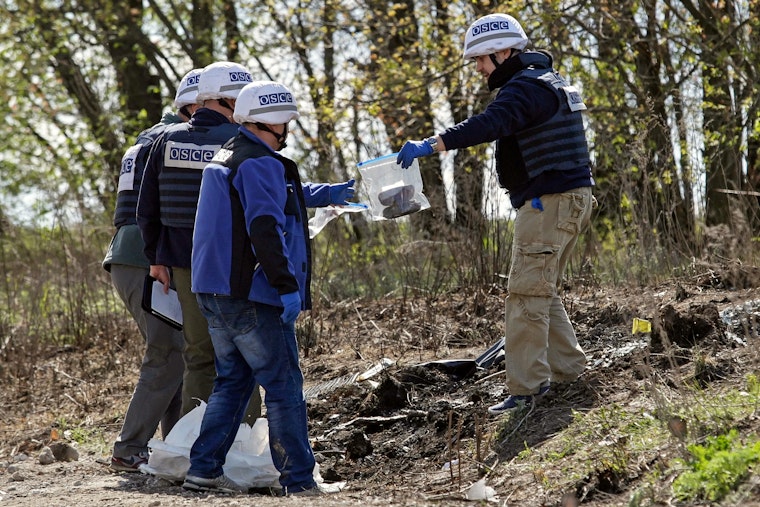An American’s Death in Ukraine Is a Wake-Up Call for Russia and the West
By Alex Johnson

Just the other week, I urged some friends who were considering international service to look at the Special Monitoring Mission (SMM), an ongoing effort that the Organization for Security and Cooperation in Europe (OSCE) is running in Ukraine. Not long after, I heard the awful news: an American volunteer, one of the nearly 700 hundred unarmed civilians from 40 countries who are working for the SMM in Ukraine, was in a terrible accident.
He was riding in an SMM vehicle on the outskirts of Luhansk when it hit a landmine. Two civilian monitors were injured, but the American, a 36-year-old paramedic named Joseph Stone, was dead.
Stone is the first civilian monitor to die in the conflict ravaging Ukraine, and his tragic demise is a further blow to those who seek to bring transparency to the Russia-fomented crisis. Officially, there is a ceasefire agreement between Ukrainian and Russian-separatist forces, one that civilian monitors are helping to implement. But according to the nearly 27,000 patrols conducted by observers in 2016 alone, there were more than 320,000 ceasefire violations.
And as SMM monitors’ research and advocacy have shown, these violations have real human costs. In the time since the “Revolution of Dignity” and Russia’s illegal annexation of Crimea began, more than 1.8 million Ukrainians have registered as displaced.
The consequences have been especially dire for those populations who were vulnerable even before the conflict. The Crimean Tatars, for example—a Turkic ethnic community with a history in the region that reaches back centuries—have experienced a radical deterioration in their ability to peacefully assemble and faced politically motivated investigations.
A few days after Stone’s death, the Austrian Foreign Minister and OSCE Chairperson-in-Office Sebastian Kurz and delegations at the OSCE Permanent Council in Vienna offered their condolences. Kurz called it “simply unacceptable” yet stopped short of directly implicating Russia. He instead urged “all actors that have an influence on the situation on the ground to live up to their responsibility in guaranteeing safety and security to the SMM.”
Unfortunately, because the Permanent Council’s weekly meeting happened, as always, behind closed doors, we only know that some delegations sought to publicly hold the Kremlin—which continues to use diplomatic maneuvers to block attempts to end the conflict—to account. So long as direct criticism of Russia from OSCE participating states is limited to closed-door meetings and negotiations, President Vladimir Putin will have no real incentive to bring the violence in Ukraine to an end.
Joseph Stone’s death should inspire the citizens of OSCE countries to demand Putin’s regime be isolated more still. Until the Kremlin ceases its efforts to snuff out Ukrainian citizens’ political rights, the U.S. and European Union sanctions imposed on Russia after its illegal seizure of Crimea should be maintained.
There should be further international commitments to uphold Ukraine’s sovereignty, and to ensure that reforms aren’t hijacked by those seeking to undermine democratic governance. If Ukraine is to protect itself while affirming its European aspirations, reforms to end corruption, increase judicial integrity, and strengthen civil society are crucial.
The United States can do more, too. While additional U.S. security assistance has improved Ukraine’s armed forces capacity in recent years, withstanding Russian military aggression will require a multifaceted approach, one that touches on all aspects of Ukrainian life.
The overarching goal of any proposal should be to increase the political and financial cost of Russian aggression, in order to stop these violent and senseless deaths. Bipartisan proposals from Congress—such as the imposition of further sanctions on individuals in Crimea responsible for human rights abuses—are encouraging, but not enough.
Ultimately, guaranteeing the restoration of Ukraine’s sovereign territory is essential to the future of Europe and Eurasia; it remains the front line of democratic aspirations in the region. Since this conflict began, an unacceptable number of people—more than 9,940—have perished. The United States and its European allies must hold Russia to account.
Until February 2019, Alex T. Johnson was the senior policy advisor for Europe and Eurasia at the Open Society Foundations in Washington, D.C.